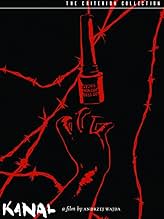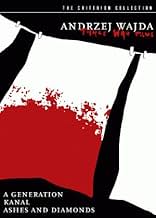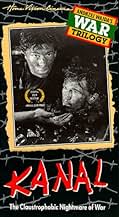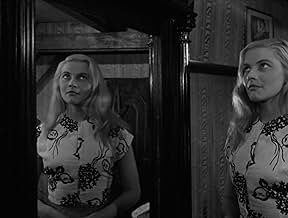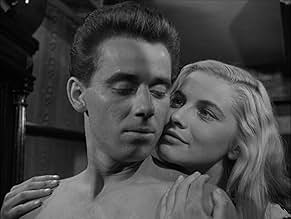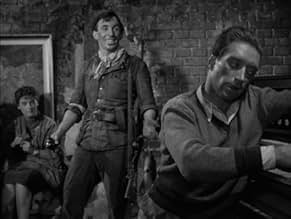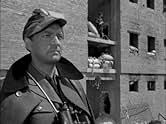AVALIAÇÃO DA IMDb
7,9/10
8,3 mil
SUA AVALIAÇÃO
Em 1944, durante a revolta de Varsóvia contra os nazistas, o tenente polonês Zadra e seus combatentes da resistência usam o sistema de esgoto de Varsóvia para escapar do cerco alemão.Em 1944, durante a revolta de Varsóvia contra os nazistas, o tenente polonês Zadra e seus combatentes da resistência usam o sistema de esgoto de Varsóvia para escapar do cerco alemão.Em 1944, durante a revolta de Varsóvia contra os nazistas, o tenente polonês Zadra e seus combatentes da resistência usam o sistema de esgoto de Varsóvia para escapar do cerco alemão.
- Indicado para 1 prêmio BAFTA
- 1 vitória e 2 indicações no total
Vladek Sheybal
- Composer Michal
- (as Wladyslaw Sheybal)
Wlodzimierz Bednarski
- Insurgent
- (não creditado)
Zenon Dadajewski
- Insurgent
- (não creditado)
Enredo
Você sabia?
- CuriosidadesDirector Andrzej Wajda was himself a fighter in the Polish resistance movement against the Nazis in World War II and several scenes in the film were based on his experiences.
- Erros de gravaçãoWhen Korab is attacking Goliath self-propelled tracked mine, a wire pulling it can be seen.
- Citações
Narrator: These are the tragic heroes: watch them closely in the remaining hours of their lives.
Avaliação em destaque
That this movie was made is a near miracle, since it squeaked out barely 3 years after Stalin died; and the Polish film industry could even begin to suggest that Poles could struggle against the Germans without Soviet "fraternal" help. It looks likely that it was saved from oblivion by the Silver Palm (1957), at least in Poland. My suspicion that this got past the Party censors as a Dantean allegory about the worker and peasant struggles, with each character and episode exposing some lesson. However, like Ashes and Diamonds, much of the real message is just at the surface: regular Poles struggling for a better future.
The real hidden message of the film is a metaphorical struggle against Soviet oppression. Wajda seems to suggest this by quoting Szczepanski(1944): "... But know this: from our tombstones A victorious new Poland will be born And you will not walk this land You Red Ruler of bestial forces!" (1) Indeed the resolution suggests the Stalinist Inferno is far from over. Those who have tried to bring light to the world suffer a Promethean fate.
What seems remarkable to me is the positive spirit, humor, and love of life that most of the characters display in the face of their passage into the underworld. There is additional irony (humorous to me), for example, that the composer attempts to play a particularly patriotic Chopin, but is then ordered to play "something with feeling:" an inane dance tune. (By the way, the Beckstein piano that the composer tries to protect was made by a company that provided Hitler with crucial early support.)
It is also remarkable that such a dark, almost anti-heroic view of combatants was made only 12 years after the event. It is not so far from the spirit of Ernie Pyle, and just think how long it took to make Band of Brothers.
(1) Interview on www.wajda.pl
The real hidden message of the film is a metaphorical struggle against Soviet oppression. Wajda seems to suggest this by quoting Szczepanski(1944): "... But know this: from our tombstones A victorious new Poland will be born And you will not walk this land You Red Ruler of bestial forces!" (1) Indeed the resolution suggests the Stalinist Inferno is far from over. Those who have tried to bring light to the world suffer a Promethean fate.
What seems remarkable to me is the positive spirit, humor, and love of life that most of the characters display in the face of their passage into the underworld. There is additional irony (humorous to me), for example, that the composer attempts to play a particularly patriotic Chopin, but is then ordered to play "something with feeling:" an inane dance tune. (By the way, the Beckstein piano that the composer tries to protect was made by a company that provided Hitler with crucial early support.)
It is also remarkable that such a dark, almost anti-heroic view of combatants was made only 12 years after the event. It is not so far from the spirit of Ernie Pyle, and just think how long it took to make Band of Brothers.
(1) Interview on www.wajda.pl
- rmoba13
- 15 de jul. de 2004
- Link permanente
Principais escolhas
Faça login para avaliar e ver a lista de recomendações personalizadas
- How long is Kanal?Fornecido pela Alexa
Detalhes
- Data de lançamento
- País de origem
- Central de atendimento oficial
- Idiomas
- Também conhecido como
- Canal
- Locações de filme
- Empresa de produção
- Consulte mais créditos da empresa na IMDbPro
- Tempo de duração1 hora 31 minutos
- Cor
- Mixagem de som
- Proporção
- 1.37 : 1
Contribua para esta página
Sugerir uma alteração ou adicionar conteúdo ausente


